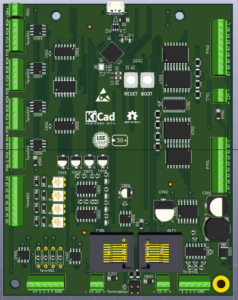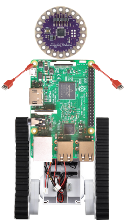ESP32-S3-MultiFunction: Multifunction board using an ESP32-S3FN8
Tags: ESP32, LCC, Model Railroad, news, OpenLCB, OpenMRN, Point Sense, press release, PWM LED Signal Lamp Driver, Stall Motor Driver
 This is a LCC node circuit board that is based around an Espressif ESP32-S3FN8 MCU to manage and operate a collection of model railroad sensors and actuators. The board contains these I/O sections:
This is a LCC node circuit board that is based around an Espressif ESP32-S3FN8 MCU to manage and operate a collection of model railroad sensors and actuators. The board contains these I/O sections:
-
Four occupancy detectors. CT Coil type sensors, so they won’t work with DC systems without an AC bias.
-
Four stall-motor drivers with point sense.
-
Four Schmitt Trigger inputs, meant for push buttons.
-
Four Buffered outputs, by default for Panel LEDS, but with drop in resistors, can also drive relays or other loads.
-
Sixteen PWM Led drivers. These are meant to light (LED) lamps in signal heads.
The board connects to a LCC network and utilizes the Event Transport Protocol in its operation. It also uses a CDI to describe its configuration. It can be configured with JMRI or other available LCC configuration tools.
The board draws about 30ma, plus load. Circuitron specifies that a Tortoise switch machine draws about 16ma when stalled, so four Tortoise switch machines would add 64ma. There is a terminal block near the stall motor terminal blocks to optionally provide external power for the switch machines. There are 16 signal lamp outputs that have 1.5K Ohm load resistors, this means about 8ma per LED. If all lamps are on at full brightness, this comes to 128ma, although turning all 16 signal on full at a time is not likely to be prototypical, since most signal aspects only light one lamp per head. There is a terminal block to optionally supply external power for the signal lamps, as a way to reduce the load on the LCC power bus. The buffered output section uses an external power source, so does not add any load to the LCC power bus.
This board is a multi-purpose board that can be used in a number of situations, including (but not limited to): one end of a siding, a yard or terminal throat, ABS, and interlocking plants.
Complete design information is available on GitHub. The first five of these boards are being fabricated by PCBWay, which I have used for my other boards. They do an excellent job and I recommend them to anyone seeking to get a small run of PCBs made, either bare boards or fully assembled boards.







